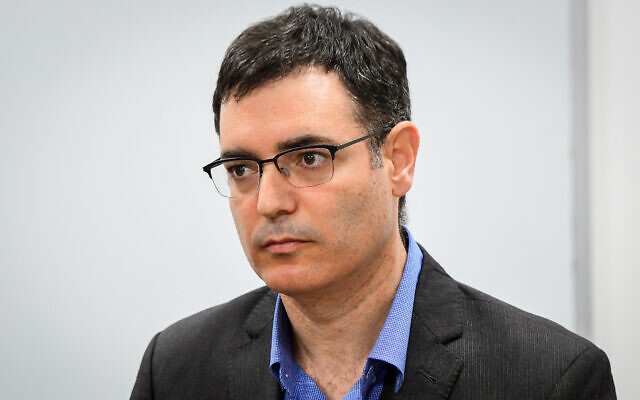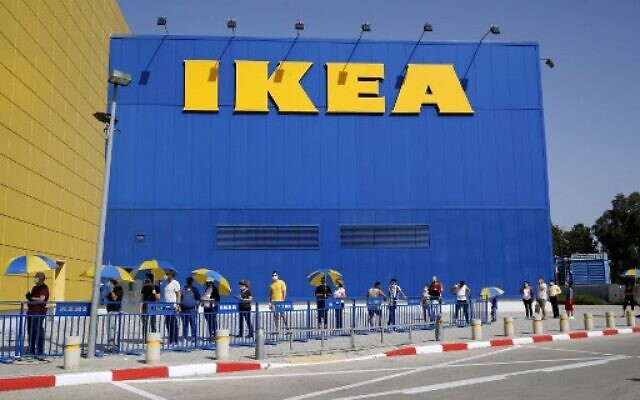Ministers said to slam health chief ahead of cabinet talks on easing rules
Unnamed ministers tells Channel 12 Bar Siman-Tov’s decisions have no rhyme or reason: ‘We’re losing the public and we need its cooperation’

Unnamed ministers speaking to Channel 12 heavily criticized the conduct of Health Ministry Director-General Moshe Bar Siman-Tov, with one accusing him of “thinking we’re in a totalitarian state that tells citizens what they’re allowed to do. In which citizens need approval to go out into the street, to engage in physical activity and to make a living.”
The person said it was unreasonable for Bar Siman-Tov not to give detailed explanations for why he was authorizing some stores to open now but not others, claiming he was making decisions “without data and without facts.”
One minister told the network: “We’re losing the public and we need its cooperation.”
The cabinet was scheduled to discuss a further easing of restrictions on Thursday night, but the meeting was postponed until 8 a.m. Friday due to a delay in getting information materials and legal opinions, the Ynet news site reported.
Bar Siman-Tov admitted on Wednesday, “We are aware that we should have made some decisions more logically, but we will fix it.”
Bar Siman-Tov and Prime Minister Benjamin Netanyahu have reportedly often been at odds with cabinet ministers throughout the crisis, with the Health Ministry chief regularly pushing for strict measures and Netanyahu tending to agree with his line. Ministers have warned of the need to balance health considerations with economic ones and urged a softer approach.
The past few days have seen growing expressions of public frustration and anger over the continued lockdowns and workplace closures that are, for some, financially ruinous. Meanwhile many out-of-work individuals have questioned this week’s decision to open some businesses while keeping others closed, claiming they were made without detailed or clear reasoning.
Swedish furniture retailer IKEA made headlines Wednesday when it opened its doors to the public, with long lines of eager shoppers forming outside its stores while many other businesses remained shuttered under emergency regulations.

Lottery booths throughout the country also reopened, with the Finance Ministry saying they met the required standards.
Critics pointed to the matter as a symbol of the government’s seemingly arbitrary regulations and attitudes toward different businesses.
Abir Kara, head of a large Facebook group of independent business owners, told Channel 12 the moves signified decision-makers’ “failed management” of the economy.
“Bringing back a lottery booth means you can also bring back a falafel stand, or any other stand, that meets appropriate regulations,” he said.
The government has faced pressure to accelerate reopening the economy, though officials have expressed fears that the virus could easily rebound and warned that tighter restrictions could yet be put back in place.
Small business owners have been pushing for the government to allow them to reopen, citing weeks of lost income.
On Sunday hundreds protested near the Knesset, blocking roads and setting fire to tires, as they demanded that the government help them weather lockdown orders that have left them unable to earn an income for several weeks.

Tali Friedman, who represents stall owners at Jerusalem’s Mahane Yehuda open-air market, told the Ynet news site that stores will reopen on Sunday whether they are allowed to or not.
“It’s ridiculous that places that are unessential, like IKEA, are opening and have long lines out the doors, and the market sellers are left to suffer,” she said.
Ministers also pointed to IKEA’s opening as a sign of hypocrisy during government discussions earlier in the day on allowing more stores to open.
“It cannot be that IKEA is open while schools remain close,” Education Minister Rafi Peretz told Bar Siman-Tov, according to Ynet.
According to the latest guidelines, workplaces in the industry, production and services sectors are allowed to have 30 percent of their employees come to work, or 10 workers at the same time at the same workplace — whichever is higher.
Meanwhile certain types of shops — such as those selling electrical goods, household goods and opticians — are allowed to open under certain restrictions, including taking body temperatures upon entry, delineating a two-meter distance between customers at cash registers, erecting a physical barrier between buyer and seller and frequent disinfecting.
Shopping malls, markets, restaurants, toy stores, beauty and hair salons and clothing stores remain closed at this time.
The cabinet on Wednesday voted in favor of severely limiting commemorations and celebrations of Israel’s Independence Day and Memorial Day next week and the Muslim holy month of Ramadan, in the latest bid to stem the spread of coronavirus.









